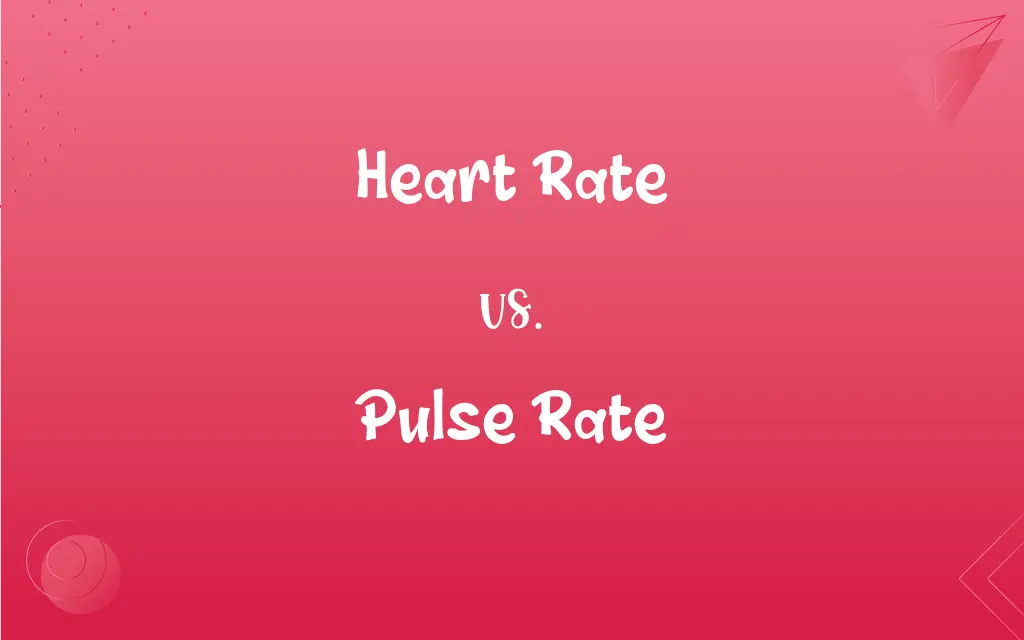Heart Rate vs. Pulse Rate: What's the Difference?
Edited by Aimie Carlson || By Harlon Moss || Updated on October 8, 2023
Heart rate refers to the number of heartbeats per minute, while pulse rate denotes the palpable beat caused by the pumping action of the heart. Essentially, they typically represent the same measure but are detected differently.

Key Differences
The term "heart rate" generally points towards the frequency of cardiac activity within a specific time frame, commonly per minute. The heart rate indicates the number of times the heart contracts or beats in a minute. It embodies the function of the heart as it pumps blood, ensuring oxygen and nutrients are delivered to various body tissues. Medical professionals often measure heart rate using tools like electrocardiograms, ensuring a comprehensive observation of the heart’s activity.
Conversely, "pulse rate" is the frequency of your pulse, palpable at numerous spots on your body where arteries run close to the skin surface, predominantly detected by tactile means. It reflects the tangible consequence of the heart's pumping activity. When the heart beats, it propels blood along the arteries; this surging of the blood can be felt as a "pulse." The pulse rate, practically obtained manually by professionals or laypersons, often uses areas like the wrist or neck to discern the arterial pulse.
Though heart rate and pulse rate might seem synonymous, and while they are often used interchangeably in colloquial language and even clinical settings, there exists a nuanced distinction rooted in their methods of assessment. Heart rate holds a more internal focus, specifically referring to the cardiac cycle and the associated electrical activity. On the other hand, pulse rate connects more with the external, perceptible repercussions of the heart's action, particularly via the arterial walls.
An intriguing differentiation resides in the conceptual frames: heart rate refers to an electrical event, while pulse rate pertains to a mechanical outcome. The heart rate encapsulates the entirety of the heart’s electrical activity, recorded comprehensively with an ECG. Alternatively, the pulse rate is the perceptible manifestation of the heart's mechanical activity, signifying how each heartbeat generates a pulse wave that travels through the arterial system, felt at the aforementioned pulse points.
The subtle divergence between heart rate and pulse rate, though nuanced, carries clinical relevance. In scenarios like a "pulseless electrical activity" (PEA) situation in a patient, the heart rate (detectable electrically) may be present, but there might be no effective cardiac output, resulting in no palpable pulse rate. This discrepant occurrence underscores the potential criticality in understanding the difference in certain medical contexts.
ADVERTISEMENT
Comparison Chart
Definition
Beats of the heart per min
Palpable beats in arteries per min
Measurement Tool
Electrocardiogram (ECG)
Manual palpation or pulse oximeter
Activity Type
Electrical
Mechanical
Assessment Location
Directly from the heart
Various pulse points in the body
Discrepancy Scenarios
Can exhibit a rate in pulseless conditions
Always represents a pumping, effective heartbeat
ADVERTISEMENT
Heart Rate and Pulse Rate Definitions
Heart Rate
The numerical representation of cardiac rhythm, viewed via electrocardiography.
During the stress test, the patient’s heart rate was continuously monitored.
Pulse Rate
The number of palpable arterial beats per minute, typically mirroring the heart rate.
He measured his pulse rate by feeling the radial artery and counting the beats.
Heart Rate
The measure of heartbeats observed through electrical activity.
After running, her heart rate spiked, indicating increased cardiac activity.
Pulse Rate
The physical pulsations of the arteries, aligning generally with cardiac contractions.
Her pulse rate slowed down as she relaxed and took deep breaths.
Heart Rate
The frequency at which the heart contracts, typically measured per minute.
My doctor said a resting heart rate of 60-100 beats per minute is considered normal for adults.
Pulse Rate
The rhythmic throbbing in arteries subsequent to each heart contraction.
During intense exercise, it is normal for the pulse rate to increase to supply muscles with more oxygen.
Heart Rate
The quantification of the cardiac cycles occurring in a minute.
Regular exercise can lower your resting heart rate by improving cardiac efficiency.
Pulse Rate
The perceptible, rhythmic pressure of blood against the walls of an artery, usually equal to heart rate unless in certain pathological conditions.
In certain arrhythmias, the pulse rate may not correspond to the heart rate due to ineffective heart contractions.
Heart Rate
The specification of heart contractions over a set period, influencing circulatory efficacy.
Meditation can help in managing stress and subsequently stabilizing your heart rate.
Pulse Rate
A tangible manifestation of the heart pumping blood, felt at various points in the body.
A rapid pulse rate can sometimes indicate fever or dehydration in a patient.
FAQs
Can heart rate and pulse rate differ?
Yes, in certain pathological conditions like pulseless electrical activity (PEA), the heart rate and pulse rate can differ.
What is heart rate?
Heart rate refers to the number of heartbeats per minute.
What is pulse rate?
Pulse rate is the number of palpable pulses in the arteries, typically equal to the heart rate, measured per minute.
What is a normal resting heart rate for adults?
A normal resting heart rate for adults ranges from 60-100 beats per minute.
How is pulse rate measured?
Pulse rate is often measured manually by palpating an artery or using a pulse oximeter.
Can you feel your own pulse rate?
Yes, common pulse points to check pulse rate include the wrist, neck, and temple.
Can physical activity affect heart rate?
Yes, physical activity typically increases heart rate to supply muscles with more oxygen and nutrients.
Is a higher resting heart rate a cause for concern?
Potentially, as a higher resting heart rate may be linked to higher risk of heart disease and other conditions.
Why is my pulse rate sometimes irregular?
An irregular pulse may be due to arrhythmias or other cardiac conditions and should be evaluated by a healthcare professional.
Does heart rate change with age?
Yes, resting heart rate typically decreases with age and with improved cardiovascular fitness.
Can medication affect your heart rate?
Yes, certain medications can raise or lower heart rate as a side effect.
What is tachycardia?
Tachycardia refers to a faster than normal heart rate, typically above 100 beats per minute in adults.
Can breathing techniques influence pulse rate?
Yes, deep and mindful breathing can often slow down your pulse rate.
Can hydration status impact pulse rate?
Yes, dehydration can elevate pulse rate as the heart works harder to pump blood through the body.
How is heart rate measured?
Typically, heart rate is measured using an electrocardiogram (ECG) or by palpating the pulse and counting the beats.
What factors can affect heart rate?
Factors like age, fitness level, stress, fever, and medical conditions can affect heart rate.
What is bradycardia?
Bradycardia refers to a slower than normal heart rate, typically below 60 beats per minute in adults.
Why might a doctor monitor your pulse rate?
Monitoring pulse rate can reveal information about hydration, stress levels, and overall cardiovascular health.
Is pulse rate always consistent between different pulse points?
Generally, yes, but disparities can occur in certain conditions, revealing peripheral vascular abnormalities.
How does stress affect heart rate?
Stress can elevate heart rate by stimulating the release of adrenaline, a stress hormone.
About Author
Written by
Harlon MossHarlon is a seasoned quality moderator and accomplished content writer for Difference Wiki. An alumnus of the prestigious University of California, he earned his degree in Computer Science. Leveraging his academic background, Harlon brings a meticulous and informed perspective to his work, ensuring content accuracy and excellence.
Edited by
Aimie CarlsonAimie Carlson, holding a master's degree in English literature, is a fervent English language enthusiast. She lends her writing talents to Difference Wiki, a prominent website that specializes in comparisons, offering readers insightful analyses that both captivate and inform.































































